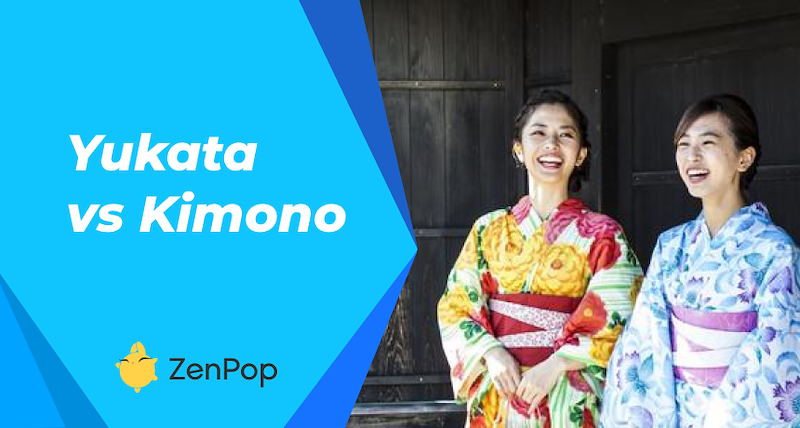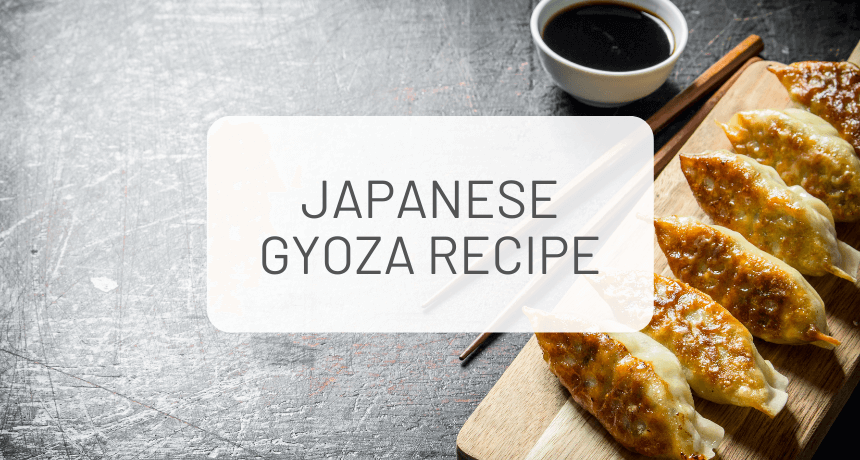
</title><meta name="robots" content="noindex">Easy Japanese Gyoza Recipe (Japanese Dumpling)
Welcome to another ZenPop recipe to develop your Japanese cuisine knowledge. Today we’re going over the classic Gyoza (餃子) - a Japanese pan-fried dumpling inspired from the original Chinese dumplings known as Jiaozi (餃子). You’ll notice that the characters used are the same, and indeed, they are very similar.
Gyoza are extremely popular in Japan, and everyone loves their crispy and golden outer layer filled with a juicy mix of meat, garlic and vegetables. They are served as side dishes, or can be a perfect appetizer! You can find them on the menus of nearly every izakaya in Japan, as well as festivals, or ramen restaurants.
What is a gyoza?
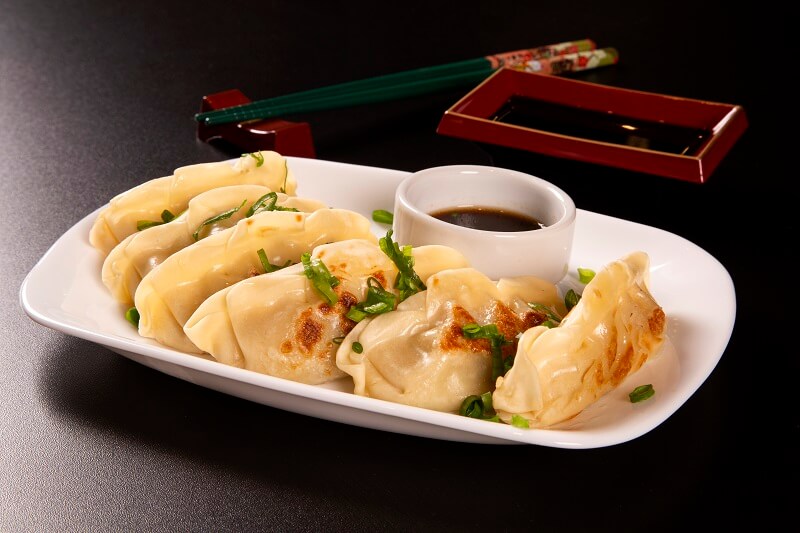
Source: Freepik
To keep it very simple, gyoza (餃子) are a Japanese adaptation of the Chinese dumplings called Jiaozi (餃子). These dumplings are usually a mix of ground meat and vegetable wrapped into dough, which is traditionally closed by pressing the edges together with the tips of your fingers. There are different ways to cook them, some are boiled (水餃), or steamed (蒸餃), sometimes pan-fried (煎餃, known in English as potstickers), or also deep-fried (炸餃子).
Now you’re wondering, how are the Japanese dumplings different? What sets the Japanese gyoza (餃子) apart is the cooking method, which combines both pan-frying and steaming. You usually fry them first under medium heat until you get that crispy golden brown color on the outside, and then you steam the dumplings to cook them through. That’s how you achieve the best of both worlds!
So now, how do you do it? How do you get that crispy bottom and soft top with the juicy filling?
Gyoza Fillings
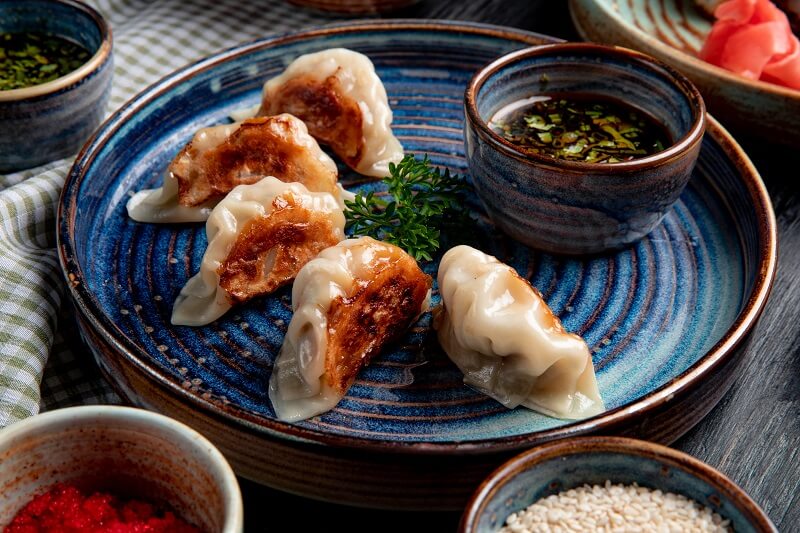
Source: Freepik
- Pork – Classic gyoza usually consists of ground pork. Of course, if you’re making them at home, you can always opt for ground beef or chicken, or make vegetarian versions, but the regular gyoza recipe is made with pork.
- Cabbage – Regular cabbage is commonly used for gyoza.
- Chinese Chives – If you can’t find those, green onions are perfect for gyoza too.
- Aromatics – Garlic is nearly always used in Japanese gyoza. Actually, Japanese gyoza are often said to have a stronger garlic flavor than the original Chinese version of the dish.
- Seasonings – Quick and easy to make: soy sauce, sesame oil, and a pinch of salt and pepper.
- Your personal favorites – Try them with shiitake mushrooms or seasonal vegetables.
Gyoza Wrappers
Of course, you could make everything from scratch. But to be honest, that’s quite complicated and time-consuming. Nowadays, most Japanese buy the wrappers from the store. Overseas, you can probably find them at Japanese or Asian grocery stores.
Gyoza Folding Techniques
There are different ways to fold gyoza wrappers. You can check out the video below for an easy guide to making nicely shaped dumplings at home!

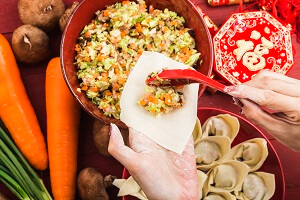
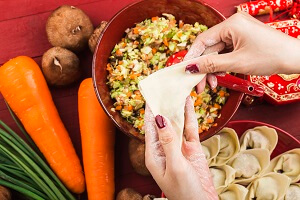
Source: Freepik
How to Store Gyoza
If you want to keep the texture and crispness of your gyoza, you should store them in the freezer before cooking them. That’s right. If you cook them first, they’ll get soggy once you reheat them, and you don’t want that. I’m not saying you can’t, just saying you shouldn’t. If you keep them in the freezer before cooking, you should be able to keep them for about a month!
Gyoza Dipping Sauce
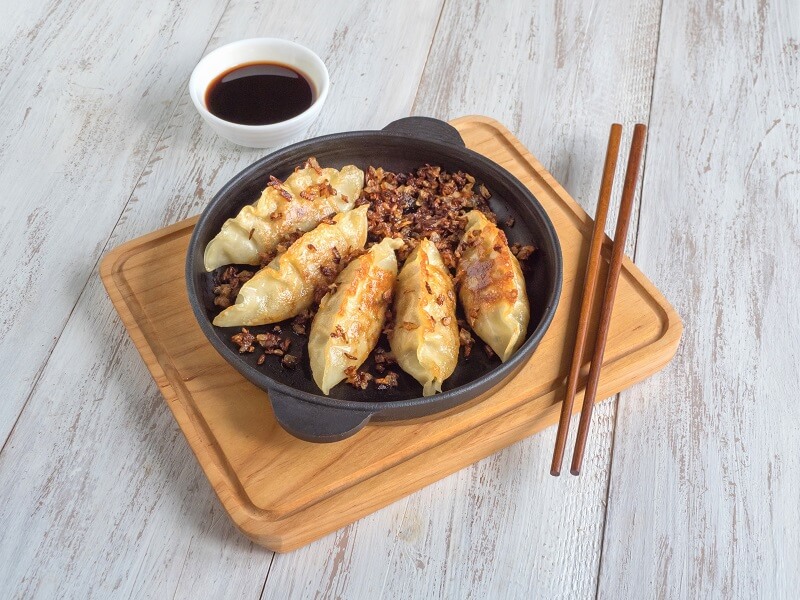
Source: Freepik
At the restaurant, gyoza are most of the time served in a group of six or eight. They can be enjoyed as a meal on their own, and some restaurants specialize in this dish, even offering giant versions to test your abilities to digest over-human portions.
Gyoza are tastiest when enjoyed with a classic dipping sauce made of soy sauce, rice vinegar (mirin), and a bit of la-yu (Japanese chili oil).
Don’t be scared of making your gyoza at home. It’s easier than it looks. All you need is a little practice, and you’ll get to it. It’s also really fun to make with friends or a partner! And sharing your own creations later makes everything even more savory.
So, let’s now get down to it. Here’s what you need, and what you need to do.
- PREP TIME: 30 mins
- COOK TIME: 30 mins
- TOTAL TIME: 1 hr
Ingredient List
- 2 tbsp cornflour
- 26 ready-made gyoza skins, defrosted if frozen
- 2-3 tbsp vegetable oil
For the filling:
- 4 spring onions, ends trimmed, roughly chopped
- 2 large leaves of Savoy or pointed cabbages, hard stem removed, roughly chopped
- a 1½cm piece of ginger, peeled and chopped
- 1 garlic clove
- 2 tsp soy sauce
- 1 tsp cooking saké or rice wine vinegar (mirin)
- ½ tsp sesame oil
- 140g minced pork or chicken
For the soy dipping sauce:
- 2 tbsp soy sauce
- 1 tbsp rice vinegar
- 2 tsp sesame oil
For the yuzu dipping sauce:
- 2 tbsp soy sauce
- 2 tbsp Yuzu juice
- 2 tsp peanut oil
The Preparation Method
Prepare all the ingredients before starting.
Pro-tip: After you open the gyoza wrappers, make sure to cover them under a damp towel or plastic wrap, to avoid them drying out.
-
Take the spring onions, cabbage, ginger and garlic in a food processor, and finely chop them (or if you have a food processor, you can use that).
-
Add the soy sauce, sake (or mirin), sesame oil and a pinch of salt, and mix again.
-
Put everything into a bowl and add the minced pork or your meat of choice. Mix by hand let it rest until ready to use.
-
Prepare a small bowl of water and sprinkle some cornflour onto a plate. To prepare the gyoza, hold the dumpling skin in the palm of one hand and place a teaspoon of the filling in the center.
-
Dip one finger in the water and gently wipe around the edge of the skin – this will moisten it and help the edges stick together.
-
This is what you’ve been waiting for. Bring it together. Pinch pleats along one side, then press each pleat against the opposite flat side of the skin. Make sure that you are properly closing them and keep the filling inside. Place each gyoza onto the plate dusted with cornflour and cover them with cling film. You can chill them for up to 8 hrs, or cook them right away if hungry.
-
Heat a non-stick frying pan with 1 tbsp vegetable oil. Brush off any excess cornflour from the bases of the dumplings. Traditionally, you will fry the gyoza only one side to get it crispy, and steam the rest after. But if like me, you love that crisp, nothing prevents you from fully crisping them!
-
Add a splash of water to the pan, not too much, and cover with a lid or a large sheet of foil with a few holes poked in the top. Cook over a medium heat for 3-5 mins until the water evaporates, and the gyoza filling is cooked through. You can put them aside once cook to prepare more if you have.
-
Prepare your dipping sauce by simple mixing and gently stirring the ingredients: soy sauce, mirin, salt and pepper. You can also use an extra side of spicy sauce.
If you want to enhance your gyoza seasoning even further, try sprinkling a little shichimi on top for a light spicy touch!



